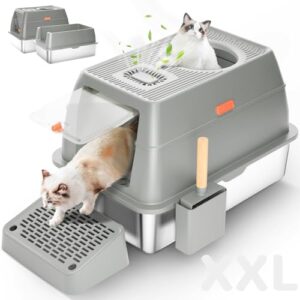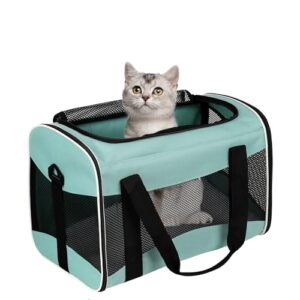Cat Trees and Climbing Structures: Essential for Cat Well-Being
Introduction
Cats are natural-born climbers with an innate desire to explore vertical spaces. This instinct is deeply rooted in their evolutionary history as both predators and prey. In the wild, climbing allows cats to survey their territory, escape threats, and stalk prey from above. Providing domestic cats with cat trees and climbing structures isn’t just a luxury—it’s an essential component of their physical and mental well-being.
These structures mimic the natural environment cats would experience outdoors, allowing them to express their innate behaviors in a safe, indoor setting. By incorporating cat trees and climbing structures into your home, you’re not just furnishing your space; you’re creating a feline-friendly habitat that supports your cat’s instincts and overall health.
Types of Cat Trees and Climbing Structures
- Condo-style cat trees: These multi-level structures typically feature platforms, enclosed spaces (condos), and scratching posts. They’re ideal for multi-cat households or for cats who enjoy variety in their climbing and resting spots.
- Wall-mounted cat shelves: Perfect for maximizing vertical space without taking up floor area, these shelves can be arranged in various configurations to create climbing paths and perches along your walls.
- Freestanding cat trees: These standalone structures come in various heights and designs. They’re easy to move and can be placed in different areas of your home to provide fresh perspectives for your cat.
- Window perches: These platforms attach to windowsills or glass surfaces, giving cats a sunny spot to observe the outside world. They’re especially beneficial for indoor cats, providing mental stimulation and a dose of natural light.
- Multi-level climbing structures: These elaborate setups can incorporate bridges, tunnels, and multiple platforms, creating an entire cat playground. They’re excellent for active cats or homes with multiple felines.
Benefits of Cat Trees and Climbing Structures
Physical Health
- Muscle maintenance: Climbing and jumping help cats maintain strong muscles, particularly in their legs and core.
- Flexibility: Navigating different levels and obstacles keeps cats limber and agile.
- Coordination: Balancing on platforms and making precise jumps improves a cat’s motor skills and spatial awareness.
- Weight management: The physical activity involved in climbing can help prevent obesity, a common health issue in indoor cats.
Mental Stimulation
- Encourages play: Many cat trees incorporate dangling toys or attachments that promote playful behavior.
- Exploration: New structures give cats novel environments to investigate, satisfying their curiosity.
- Problem-solving: Figuring out how to reach different levels or navigate obstacles engages a cat’s cognitive abilities.
- Environmental enrichment: Varied textures, heights, and hiding spots create a stimulating environment that prevents boredom.
Stress Relief
- Safe retreat: Elevated spaces give cats a sense of security, allowing them to observe their surroundings from a safe vantage point.
- Territory establishment: In multi-cat households, trees and structures provide additional territory, reducing conflict.
- Anxiety reduction: Having a designated “safe space” can help cats manage stress during changes in their environment or routine.
Preventative Behavior
- Scratching outlets: Many structures include scratching posts, redirecting this natural behavior away from furniture.
- Furniture preservation: By providing alternative climbing and perching spots, cats are less likely to use household furniture for these purposes.
- Positive outlet for energy: Active play on climbing structures can reduce destructive behaviors born from boredom or excess energy.
Choosing the Right Cat Tree or Climbing Structure
- Consider your cat’s age, size, and activity level:
- Kittens and young cats may prefer more complex structures with multiple levels and play features.
- Older or less agile cats might benefit from structures with wider platforms and gentler inclines.
- Larger cats need sturdier constructions with ample space on each level.
- Choose a structure that provides multiple levels and hiding places:
- Variety encourages exploration and provides options for different moods and activities.
- Enclosed spaces offer a sense of security for shy or anxious cats.
- Ensure the structure is stable and secure:
- Look for a wide, heavy base to prevent tipping.
- Check that all parts are securely fastened.
- Consider anchoring tall structures to the wall for added safety.
- Select a material that is durable and easy to clean:
- Sisal rope is excellent for scratching posts as it’s durable and satisfying for cats to use.
- Carpeted surfaces should be tight-weaved to resist snagging from claws.
- Removable, washable covers can make maintenance easier.
Placement and Maintenance
- Place the cat tree or climbing structure in a central location with good visibility:
- Near windows for outdoor views.
- In areas where the family spends time, allowing the cat to feel included.
- Away from noisy appliances or high-traffic areas that might startle the cat.
- Clean the structure regularly to maintain hygiene and prevent odors:
- Vacuum or brush surfaces weekly to remove hair and debris.
- Spot clean any stains or marks promptly.
- Deep clean or wash removable parts monthly, or more often if needed.
- Replace any worn or damaged parts promptly:
- Check for loose screws or wobbling platforms regularly.
- Replace frayed sisal rope or torn fabric to maintain the structure’s appeal and safety.
Encouraging Use
- Introduce the cat tree or climbing structure slowly:
- Allow your cat to investigate at their own pace.
- Don’t force interaction; let curiosity take the lead.
- Use treats or toys to encourage exploration:
- Place favorite treats on different levels to entice your cat.
- Dangle toys from higher perches to spark interest in climbing.
- Provide a scratching post nearby:
- Many cats like to stretch and scratch after waking from a nap.
- Having a scratching surface near resting spots encourages natural behavior.
- Make sure the structure is accessible and comfortable for your cat:
- Ensure platforms are wide enough for your cat to turn around comfortably.
- Add soft blankets or beds to make perches more inviting.
Conclusion
Cat trees and climbing structures are far more than just pieces of feline furniture—they are essential components in creating a fulfilling environment for your cat. By providing these vertical spaces, you’re supporting your cat’s physical health, mental stimulation, and emotional well-being. The benefits extend beyond your cat to you as well; a happy, well-exercised cat is more likely to be a well-behaved companion.
Remember that every cat is unique, and it may take some trial and error to find the perfect combination of structures and placements that appeal to your feline friend. Be patient, observe your cat’s preferences, and don’t hesitate to make adjustments. With the right cat trees and climbing structures in place, you’ll be rewarded with a content, active, and enriched feline companion who feels truly at home in your shared living space.
Resources
- Additional Information and Support:
- Consult with your veterinarian for specific recommendations based on your cat’s health and lifestyle.
- Local pet stores often have knowledgeable staff who can provide advice on selecting appropriate structures.
- Online cat forums and communities can be great resources for real-world experiences and creative DIY ideas.
- Consider reading books on cat behavior and environmental enrichment for more in-depth understanding of your feline friend’s needs.
-
Stainless Steel Cat Litter Box with Lid, XXL Enclosed Anti-Urine Leakage Litter Box with Removable Lid & Scoop for Big Cats by [Brand Name]
Rated 0 out of 5$139.99Original price was: $139.99.$129.99Current price is: $129.99. Litter Box Training Aids -
Pet Collar Camera: Spy Camera Hidden Collar for Dogs and Cats with 64GB SD Card
Rated 0 out of 5$22.68 Cat Cameras -
HD 1080P Cat Camera Collar with 16GB SD Card for Indoor/Outdoor Pet Monitoring
Rated 0 out of 5$23.99 Cat Cameras -
Catit Cat Carrier – Soft-Sided, Airline Approved, for Medium to Small Cats and Dogs up to 15 Lbs
Rated 0 out of 5$19.98 Cat Carrier Training Accessories





